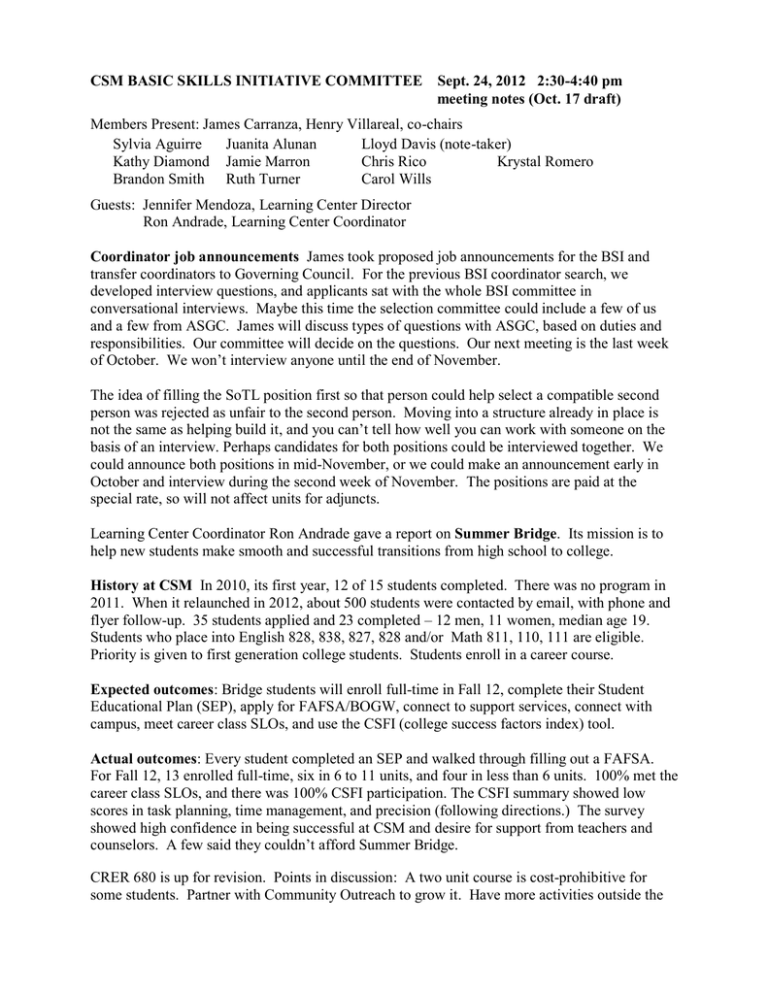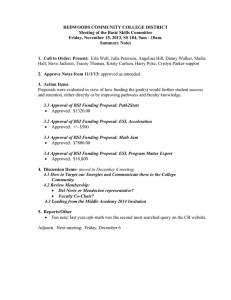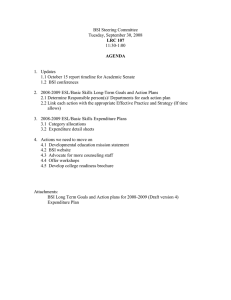CSM BASIC SKILLS INITIATIVE COMMITTEE Sept. 24,... meeting notes (Oct. 17 draft) Sylvia Aguirre
advertisement

CSM BASIC SKILLS INITIATIVE COMMITTEE Sept. 24, 2012 2:30-4:40 pm meeting notes (Oct. 17 draft) Members Present: James Carranza, Henry Villareal, co-chairs Sylvia Aguirre Juanita Alunan Lloyd Davis (note-taker) Kathy Diamond Jamie Marron Chris Rico Krystal Romero Brandon Smith Ruth Turner Carol Wills Guests: Jennifer Mendoza, Learning Center Director Ron Andrade, Learning Center Coordinator Coordinator job announcements James took proposed job announcements for the BSI and transfer coordinators to Governing Council. For the previous BSI coordinator search, we developed interview questions, and applicants sat with the whole BSI committee in conversational interviews. Maybe this time the selection committee could include a few of us and a few from ASGC. James will discuss types of questions with ASGC, based on duties and responsibilities. Our committee will decide on the questions. Our next meeting is the last week of October. We won’t interview anyone until the end of November. The idea of filling the SoTL position first so that person could help select a compatible second person was rejected as unfair to the second person. Moving into a structure already in place is not the same as helping build it, and you can’t tell how well you can work with someone on the basis of an interview. Perhaps candidates for both positions could be interviewed together. We could announce both positions in mid-November, or we could make an announcement early in October and interview during the second week of November. The positions are paid at the special rate, so will not affect units for adjuncts. Learning Center Coordinator Ron Andrade gave a report on Summer Bridge. Its mission is to help new students make smooth and successful transitions from high school to college. History at CSM In 2010, its first year, 12 of 15 students completed. There was no program in 2011. When it relaunched in 2012, about 500 students were contacted by email, with phone and flyer follow-up. 35 students applied and 23 completed – 12 men, 11 women, median age 19. Students who place into English 828, 838, 827, 828 and/or Math 811, 110, 111 are eligible. Priority is given to first generation college students. Students enroll in a career course. Expected outcomes: Bridge students will enroll full-time in Fall 12, complete their Student Educational Plan (SEP), apply for FAFSA/BOGW, connect to support services, connect with campus, meet career class SLOs, and use the CSFI (college success factors index) tool. Actual outcomes: Every student completed an SEP and walked through filling out a FAFSA. For Fall 12, 13 enrolled full-time, six in 6 to 11 units, and four in less than 6 units. 100% met the career class SLOs, and there was 100% CSFI participation. The CSFI summary showed low scores in task planning, time management, and precision (following directions.) The survey showed high confidence in being successful at CSM and desire for support from teachers and counselors. A few said they couldn’t afford Summer Bridge. CRER 680 is up for revision. Points in discussion: A two unit course is cost-prohibitive for some students. Partner with Community Outreach to grow it. Have more activities outside the classroom, and add a mentoring component. Train summer mentors in spring. A large class is not productive. CRER 101 is designed to serve the needs of everyone. Students like it. Ron noted Bridge students were too new to have signed up for DSPS. Points in discussion: Could we have paperwork and books students can listen to ready to go in the first week? Can we sign up students in May for fall? DSPS students review their educational limitations and appropriate accommodations with Kevin Sinarle. Some instructors do not give accommodations in summer. Could we bring in Kevin for summer and the day before fall starts. $5000 in BSI funds were used for Summer Bridge and peer mentoring. Reading is included on all brochures. There were community building activities, including teamwork, icebreaking, and CSFI work, during the two weeks of 9-noon sessions. Each group included an older student. The curriculum is being revamped for 2013. In 2010 there was some faculty involvement, but not in 2012. It is great that students get to know the campus and its services. We might add connections to faculty. At some colleges, Summer Bridges are longer and connect to offerings like MathJam. Our role should be advisory. Summer Bridge is a program, not a class. We could try taking non-basic skills students through it, and determine two semesters later whether it has made a difference. Skyline has a first year experience program. Students have to place into specific math and English courses, walked through as a cohort, also career class. Most Summer Bridge programs guarantee enrollment in math and English courses. Ron asked people to e-mail their thoughts on peer mentoring. Other funding sources including Measure G may give additional support. There will be a tailgate event at Foothill on Oct. 13 about bridge programs. Jen thanked the committee for its support. End of Year Report and Action Plan James focused on the narrative response portion of the report: a reflection on what we would have done differently over last five years, to assist in statewide planning. The reporting form is simpler. Now we are to identify two or three long term goals for the next five years. We have 1) Professional enrichment activities, with cocoordinators; 2) Activities to promote student success we hoped to institutionalize, such as Summer Bridge, peer mentoring and peer tutoring, and Math SI. BSI is paying half the salary for Ron Andrade’s position for a year or two, because we need fulltime coordination to get things done. $90K isn’t much money, and without the leadership of James, Henry, Danita and others on how best to utilize it, even that would have been whittled away and we might have gone a different direction. Our combined committee of committed people persuaded administration. We prefer to spend money to directly support programs, rather than on salaries. James gets two units of reassigned time, and the coordinator gets $8-12K, leaving about $70K of our $90K for various projects. We now fund an $8K community college teaching and learning project for training new faculty. We decided to fund innovations once to jump start them, but some ongoing things like the annual $5K EOPS college tour have become part of our regular operating budget. $27K is in a holding account for new initiatives. It has a one year delay but can’t be carried over beyond that. Our two-year commitment to support Math SI ends in May 2013. Math is presenting an SI proposal to IPC and BPC to institutionalize SI. If it looks like the college can’t fund it, maybe BSI can. Math Boost, which started through BSI, will be discontinued, so its $30K pool will be available, which may support this initiative. LC has proposals as well. We should say why things like Math Boost or Connect to College didn’t work, but sometimes we don’t. Cheryl will talk to IPC about Math Boost. We hope IPC will do more such clearing house activity, and talk about it institutionally. People should report to us and perhaps IPC on any project BSI funds, like Summer Bridge,’ especially if it is discontinued. Lena reported to us last year, and will again this year. Faculty evaluation Evaluators of instructional faculty observe classes and administer student evaluations, which carry the most weight. A peer review committee looks at evaluations of fulltime faculty every three years. The evaluation process is now being reviewed at the district level. At CSM, part-timers with an unsatisfactory evaluation their first semester are dismissed. After that, if they get a bad evaluation they are reevaluated up to twice. If the third re-evaluation is unsatisfactory they are dismissed. At Skyline and Canada, they are dismissed if the second reevaluation is unsatisfactory. The District will decide which policy to adopt District-wide. The student evaluation form is mostly Scantron questions, but has three free response items. The forms are anonymous. The District prepares a summary of questionnaire responses. Division offices type up free responses so evaluees never see student handwriting. We should make sure students know that. Faculty evaluation is a union responsibility, so any change in the role of BSI in evaluating instructors in basic skills courses would have to be negotiated. There is high turnover in our basic skills classes, and few choices of gateway courses for students. Perhaps we could make attending BSI workshops mandatory, and adopt a more direct advocacy approach. We need to get into basic skills classrooms and get feedback to instructors is supportive ways. We want unsatisfactory behavior to change. Document any problems, and let instructors know you are paying attention. James summarized: we will have professional enrichment co-coordinators working in two areas, basic skills and SoTL, with underprepared students being in both areas. Program review is being revised to include needs for professional development and professional enrichment so we can better address faculty needs. Members discussed what information we want, including a needs analysis from BSI students, specific results from each project, and information on students who get lost and drop out. We need a mechanism to ask John Sewart to track individual students in projects we fund. Do we spend too much on the few students who persist? We need to institutionalize coordinated professional enrichment. The coordinators will take ideas to faculty groups and plan flex activities. It is worth $10K to get full-timers more engaged. We want to have a majority of faculty and classified staff participating in campus initiatives to promote student success. We want measurable outcomes, and follow-up feedback from event attendees. Faculty participants should show evidence that they have incorporated what they learned in professional development into their courses, and report implementation of new things at department meetings and in SLO assessment. We need to track these things. We should know across the campus what people are doing. Kathy Diamond, who is working on implementing Reading Apprenticeship, suggested campuswide meetings on initiatives, and not assessing results too soon. People should be allowed time to try things out. Members called for faculty and staff flex activities before classes start in spring. Opening day presenters could linger in the lobby so interested people could talk to them. Whiteboard list developed during the meeting: $90,000 isn’t that much. Full-time coordination is essential - we lost dedicated part-time coordination when Lorena del Mundo left. Communicate results more broadly, and do tracking and analysis Report to BSI and college divisions or other interested areas. IPC needs to be up to date. Advocate for basic skills students in gateway courses Make recommendations to improve programs , courses, and direct teaching. Institutional advocacy More focus on cultural identity and equity We need coordinated professional enrichment Hear more from students and do a needs analysis Positive things: RFP process works well; co-chairs are consistent advocates; consistency of membership, administrative support


